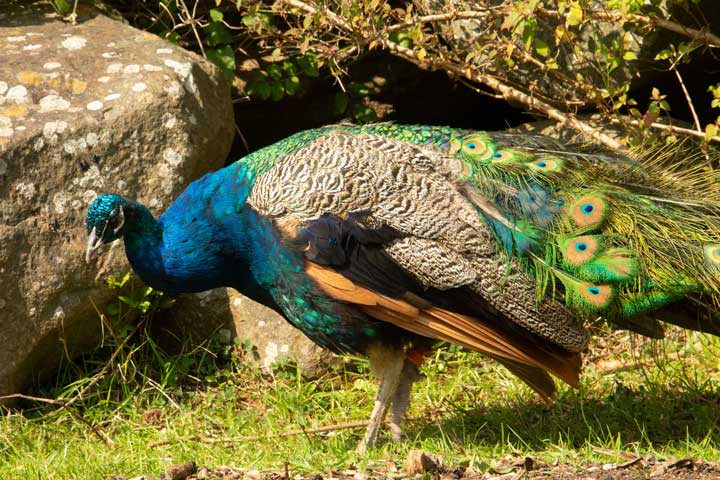Depending on the country you are in, peacocks are either considered a delicacy to have at the table or frowned upon by civilians and the law. In some places, they are near extinction and shouldn’t be considered a choice of protein for your meal.
Here’s all that you need to know about Peacocks and whether or not you should consider eating them.
What Is A Peacock?
Peacocks originate from the Phasianidae family and are closely related to other species such as quail, turkey, chicken, and pheasants. The male is called a peacock and often dawns a more colorful appearance, while the female is called a peahen and tends to display neutral colors in her feathers.
The most common species of peacock that can be found around the world is the blue peacock. The green peacock is considered sacred in India and is rarer to come across. The Congo peafowl can be located in Africa and has a fast-depleting population.
The male ones are known for their extravagant display of feathers in various blues and greens, while peahens are mostly grey and brown. These birds use their feathers to attract a mate.
Peacocks are omnivores and tend to feed on plants, insects, and other small animals. They can grow to be quite large and are listed as one of the biggest birds with the ability to fly. Once fully grown, these birds will weigh up to 14 lbs and reach a height of around 130cm.
They are most commonly found roaming freely in the wild and usually like to stay up high on trees or roofs of buildings.
Disclaimer: Peacocks are not native to the U.S and have been imported with the purpose of being domesticated animals, so they are not intended for hunting. Please do not attempt to hunt or kill a Peacock if you live in the U.S.

Do Peacocks Taste Good?
Both the peacock and peafowl are said to taste like chicken. Some claim that once brined, the meat will taste like a turkey, while others will compare it to the meat of a guinea fowl.
From what I have heard, peacock tastes closest to pheasant or turkey. In some parts of the world, peacock meat is costly due to its rarity, and in other places, the bird is considered taboo as a meal on a plate. China has a ban on eating green peacocks altogether.
Peafowl or peacock meat offers various nutrients that may appeal to those lying in the wild. Similar to its relatives, the chicken and other poultry meat, a peacock is high in protein. The meat also contains valuable minerals and vitamins, including Potassium, Vitamin B6, Vitamin B12, Iron, Magnesium, Zinc, and Niacin.
These nutrients and minerals have several health advantages. When eaten, the breasts of this bird help promote strong bones and teeth due to the high phosphorus content and an improved metabolism and immunity thanks to selenium.

Is It Legal to Eat Peacock in the U.S.?
As mentioned before, China has specific laws that protect the green peacock on a national level. On the other hand, the blue peacock is often bred in captivity for the sole purpose of consumption.
Since this bird is considered non-native to most of the countries that it can be found in, the C.I.T.E.S. international treaties have different rules to protect them.
In America, peacock meat tends to be rare when found, but it is not illegal to eat it. The only issue is the transportation of these birds across borders since they are rarely transported for good use. Domesticated birds, including chickens, geese, and certain ducks and farm-raised birds such as pheasants, ostriches, and emus, can be sold for food but not after the breeders have jumped through a few high hoops.
In some states, you’d have to apply for local, state, and federal permission to consume some birds (including parrots) even if you have bred and raised them. The peacock population seems to be stable now, but your state guidelines should determine whether or not you can try peacock meat.
Hobbyists in the U.S. are willing to pay a pretty penny for eggs from ducks, geese, and other rarer birds. They are far more expensive, meaning that the general public is less likely to purchase them.
In summary, peacock is not a protected species in the U.S., and there are no legal restrictions regarding the trading of peacock meat. The most common place you’ll find domestic peacock meat is in California.
So, depending on your ethics and beliefs, you can purchase and cook peacock or peahen meat as it is, in fact, legal to do so in the U.S. Whether or not it is morally right is up to you.
How do you cook peacock?
When cooking this bird at home or in the wild over a fire, you can look at it the same way you would: chicken, turkey, quail, or pheasant. The meat is lean and needs to be cooked slowly to achieve a successful succulent outcome.
The bones can be kept to make a stock and provide you with all the nutrients you need and keep you fed for a few days. The bird’s breast needs to be roasted as they aren’t as fatty as the rest of it. If working with an open fire, it might be best to imitate an enclosed oven or use a pot when cooking it.
The legs are best once they’ve been left to cook for around 3 hours. This will produce juicy and tender meat that will satisfy and hard-worker in the wild with a hungry belly.
What Do Peacock Eggs Taste Like?
If you’re looking to find out how peacock eggs taste, you may be looking for a long time. Peahen eggs, on the other hand, are only laid 4 to 8 times a year. The hen will only produce a few eggs every breeding season. This makes peahen eggs very expensive when looking to purchase them.
The eggs taste very similar to a chicken egg and provide an equal amount of nutrients when consumed. They tend to have higher fat content and a higher yolk to white ratio. The eggs look closest to that of a turkey egg.
Eating peacock eggs will depend entirely on your circumstances and beliefs around this majestic bird. The population of blue peacocks is stable and healthy, unlike that of the Congo peacock. Perhaps now is the time for you to try this delicacy and see if it’s any good. Make sure you check the rules and regulations of your state with regards to the legalities before consuming this majestic bird’s meat or eggs.




